Differences of Mobile DVR and Mobile NVR
If you are looking for a mobile video surveillance system for your vehicle, you may have come across two terms: mobile DVR and mobile NVR. What are they and how do they differ from each other?
Mobile DVR stands for mobile digital video recorder. It is a device that records and stores video data from analog cameras connected to it via coaxial cables. Mobile DVRs can support up to 8 cameras and offer high-resolution video quality. They also have features such as GPS tracking, G-sensor, Wi-Fi, 3G/4G connectivity, and remote access.

Mobile NVR stands for mobile network video recorder. It is a device that records and stores video data from IP cameras connected to it via Ethernet cables or Wi-Fi. Mobile NVRs can support up to 16 cameras and offer higher-resolution video quality than mobile DVRs. They also have features such as GPS tracking, G-sensor, Wi-Fi, 3G/4G connectivity, and remote access.
The main difference between mobile DVR and mobile NVR is the type of cameras they work with. Mobile DVRs work with analog cameras, while mobile NVRs work with IP cameras. Analog cameras are cheaper and easier to install, but they have lower video quality and require more cables. IP cameras are more expensive and require more configuration, but they have higher video quality and require fewer cables.
Another difference between mobile DVR and mobile NVR is the storage capacity. Mobile DVRs use hard disk drives (HDD) to store video data, while mobile NVRs use solid state drives (SSD) to store video data. HDDs have more storage space and are cheaper, but they are more prone to damage from vibration and shock. SSDs have less storage space and are more expensive, but they are more durable and reliable.
Depending on your budget, needs, and preferences, you can choose either a mobile DVR or a mobile NVR for your vehicle surveillance system. Both devices have their advantages and disadvantages, so you should weigh them carefully before making a decision.
